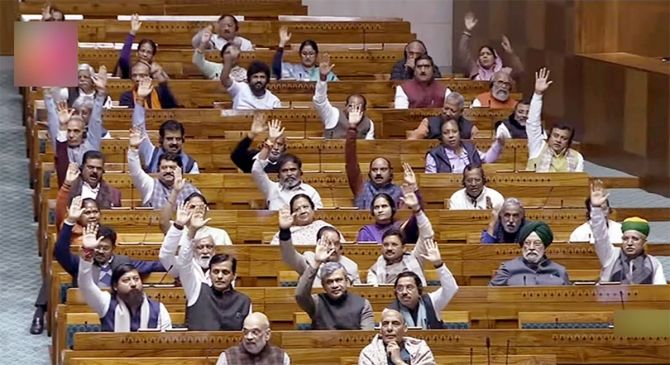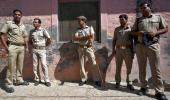Following are the key points of the three criminal law bills, that were passed by the Lok Sabha on Wednesday and seek to replace the Indian Penal Code (IPC), the Code of Criminal Procedure (CrPC) and the Evidence Act.

BHARATIYA NYAYA (SECOND) SANHITA
It seeks to replace the Indian Penal Code (IPC) of 1860.
* Twenty new offences have been added in the Bharatiya Nyaya Sanhita (BNS)
* Nineteen provisions that existed in IPC have been deleted
* In 33 offences the punishment of imprisonment has been increased
* In 83 offences the punishment of fine has been enhanced
* In 23 offences the mandatory minimum punishment has been introduced
* In six offences the punishment of 'community service' has been introduced
Major Changes:
* Definition of child is introduced
* Transgender is included in the definition of 'gender'
* Electronic and digital records are included in the definition of document
* The definition of 'movable property' is widened to include property of every description
* New chapter on offence against woman and child is introduced
* New chapter on 'inchoate offences' (attempt, abetment and conspiracy) is introduced
* New offences like organised crime, terrorist act, petty organised crime, hit and run, mob lynching, hiring child to commit offence, sexual exploitation of woman by deceitful means, snatching, abetment outside India, acts endangering the sovereignty, integrity and unity of India, publication of false or fake news etc. have been introduced
* Attempt to commit suicide is deleted
* Beggary has been introduced as a form of exploitation for trafficking
* In the definition of grievous hurt the number of days has been reduced from 20 days to 15 days
* Community service is provided as a punishment for theft of less than Rs 5,000
* Reorganisation of offences are made wherein similar provisions have been clubbed together.
Minor Changes:
* At nine places the archaic expressions like 'lunatic', 'insane' and 'idiot' have been done away with
* Colonial remnants like 'British calendar', 'Queen', 'British India, 'justice of the peace' have been deleted.
* In 44 places 'Court of Justice' has been replaced with 'Court'
* Uniformity has been brought in use of expression 'child' throughout the BNS
* Contemporary style of drafting has been used
* At 12 places 'denotes' has been replaced with 'means' and 'that is to say' is replaced with 'namely' at three places. PTI ACB
BHARATIYA NAGARIK SURAKSHA SANHITA
It will replace the Code of Criminal Procedure Act-1898.
Major Changes:
*Magistrate's power to impose fine is increased
*Scope of declaring proclaimed offender is increased. Earlier only 19 offences were included which did not include rape cases and now all offences having punishment for 10 years or more are included.
* Arrest of offences with punishment of less than three years offence with the prior approval of the senior police officers.
*15 days police custody is allowed for the first 40/60 days of the detention period and this will not be a ground for refusal of bail.
* Procedure for forfeiture and attachment of proceeds of crime is introduced
*In-absentia trial introduced and it will be upto the delivery of judgment
*Zero FIR throughout the country introduced
*Electronic lodging of FIR introduced
*Preliminary Inquiry is introduced in offences punishable from 3 years to less than 7 years
*Forensic aid in investigation introduced
*Provision for investigation of serious offence by DSP level police officer introduced
*Meaning of bail has been simplified throughout the BNSS
*First time undertrial is provided early release on bail
*Bail in acquittal cases is simplified
*First time offender to be given relaxed punishment (one-fourth and one- sixth of such punishment) in plea bargaining.
* Timeline has been prescribed in many procedures and processes like- committal, discharge etc.
* Audio video electronic means used for many processes and procedures to enhance transparency, accountability and speedy justice - like recording of evidence of witness, deposition of evidence by police officer, evidence of accused, evidence of public servant, scientific expert or medical officer, pronouncement of judgment etc.
*Scope of summary trial increased
*Videography of search and seizure is introduced
*Mercy petition related procedure is introduced
*Witness protection scheme is introduced
*Victim's right related provisions are introduced -- Definition of 'victim' expanded, police officer to inform victim/informant about progress in investigation etc.
*Provision for not more than two adjournments introduced
*Public servant is protected against false/frivolous cases
*Deemed sanction provision is introduced
*The office of Directorate of Prosecution is made more effective
*Handcuffing is introduced for heinous offences
*Notice for appearance proforma introduced Evidence of public servant and experts are allowed through audio-video means
* In 35 places audio-video electronic/ videography means are introduced to infuse transparency and accountability in delivery of justice
*In 35 places timeline is introduced to provide speedy delivery of justice.
BHARATIYA SAKSHYA ADHINIYAM
It seeks to replace the Indian Evidence Act of 1872.
* Two new sections and six new sub-sections have been added in the proposed law
* Five new explanations are added, four explanations deleted
* Two new provisos are added, 24 provisions are modified
* Total six sections are deleted
Major Changes:
* Electronic record included in the definition of 'document'
* Statements received electronically included in the definition of 'evidence'
* Added more standards for considering electronic and digital records as primary evidence laying emphasis on its proper custody, storage, transmission, and broadcast
* Added more kinds of secondary evidence to include oral and written admissions and evidence of a skilled person to examine documents which cannot conveniently be examined by court.
* Established the legal admissibility, validity, and enforceability of electronic or digital record as evidence
* Inclusion of husband/wife as competent witness in criminal proceedings against the spouse
* Conviction based on corroborated testimony of accomplice has been made legal
* Comprehensive certificate for submitting electronic evidence added in the schedule
Minor Changes:
* References to colonial terminology done away with
* Language modernized and made gender sensitive.










